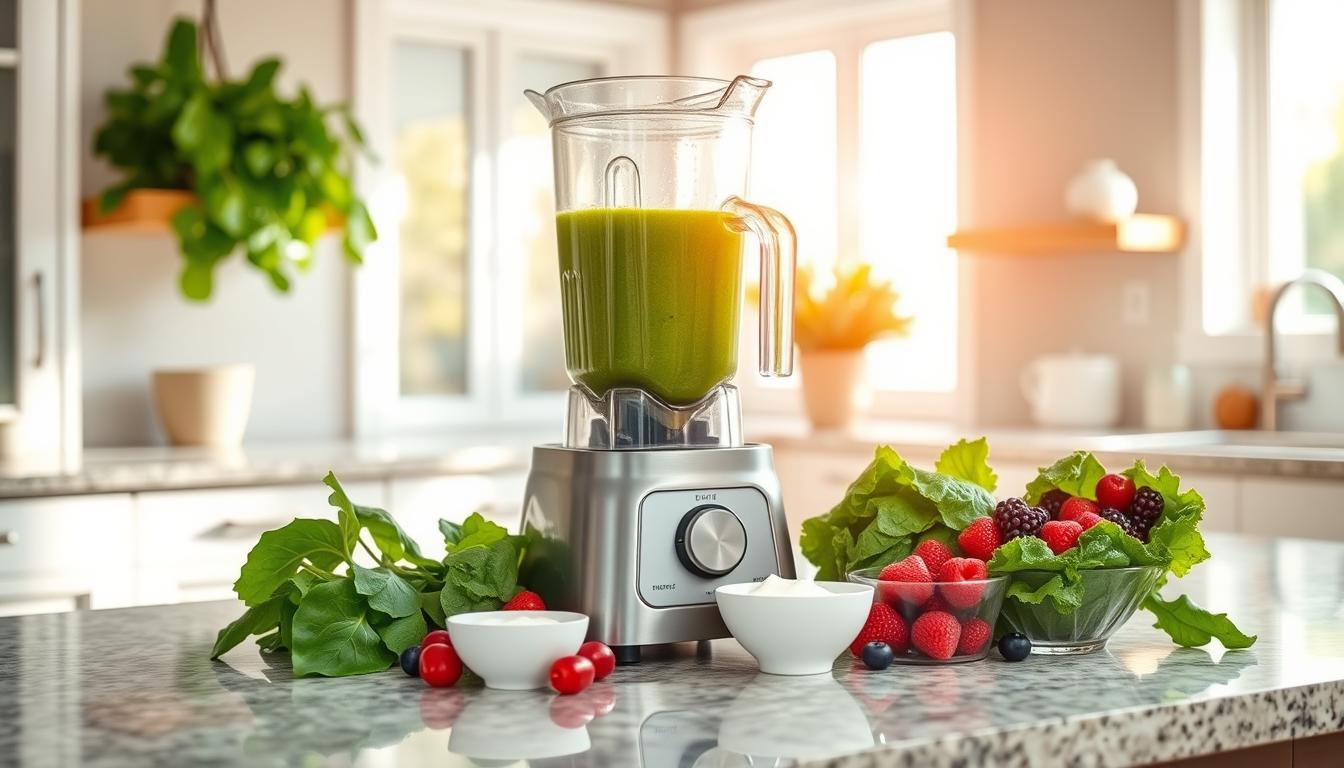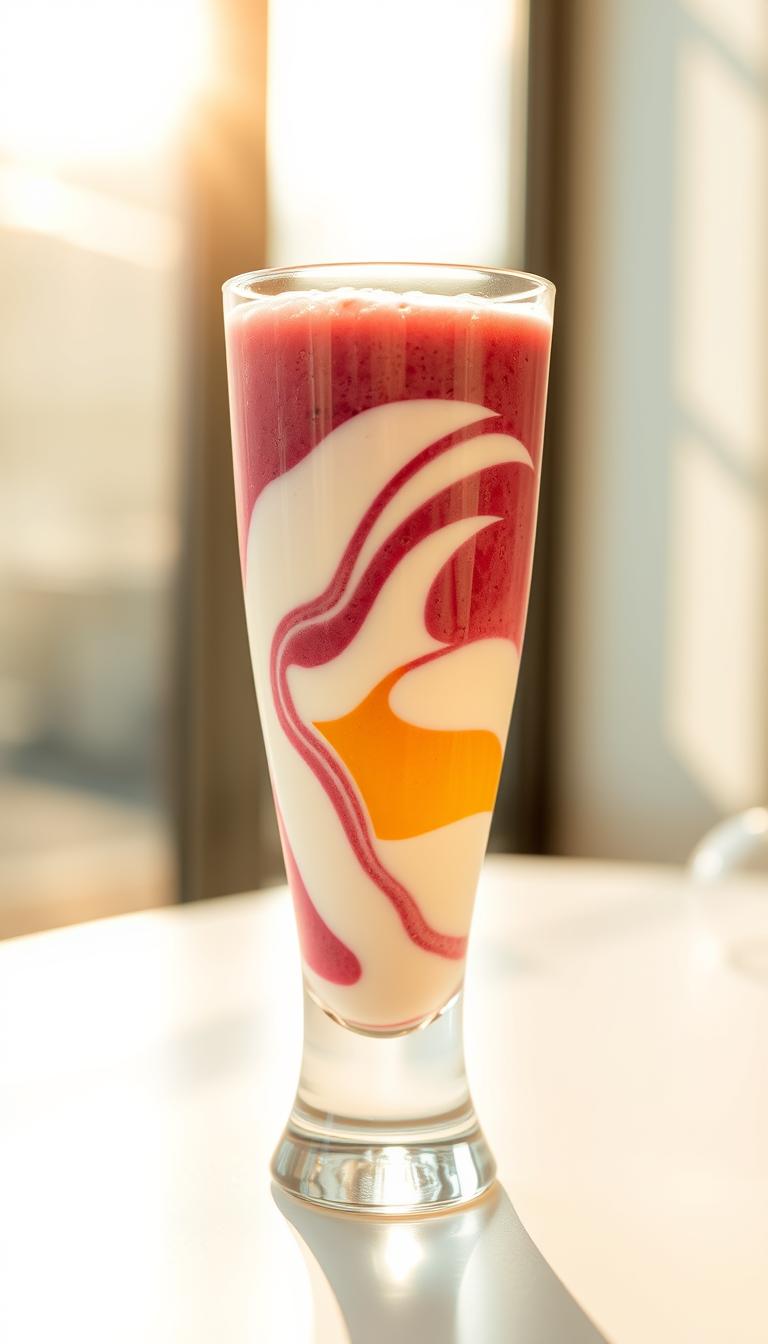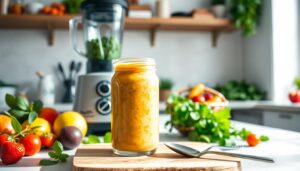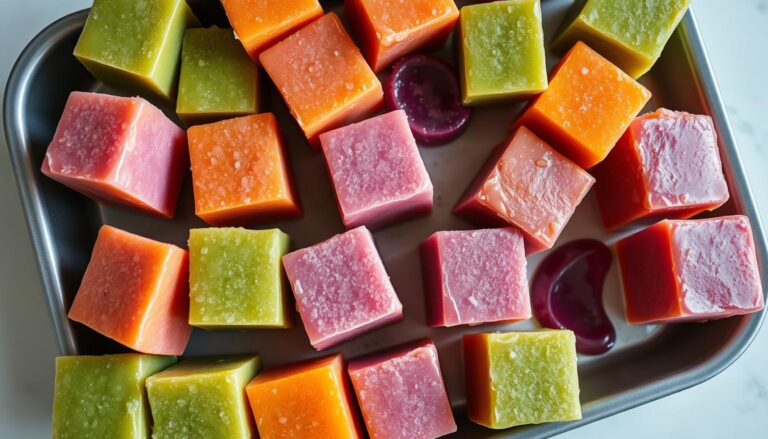Are Smoothies Good for Ulcerative Colitis is the question many vegan people ask when chewing raw foods feels painful or appetite is low.
Can a blended drink soothe your gut while still giving you the nutrition you need? This article gives a clear, data-informed way to decide when a smoothie fits your diet and symptoms.
You’ll see what research says about antioxidant-rich fruits, omega-3 seeds, and oats that boost butyrate. We explain which foods and fats to avoid during a flare and how texture, liquid choice, and portion size can help you tolerate food.
Use our Smoothie Generator to match ingredients to your stage, taste, and comfort: https://healthconservatory.com/smoothie-generator
Key Takeaways
- Smoothies can be a gentle way to get nutrients when chewing is hard, if you choose low-irritant ingredients.
- Focus on antioxidant fruits, omega-3-rich seeds, and soluble-fiber options like cooked apples or green banana.
- Oat bran and resistant starches may help butyrate and reduce inflammation based on research.
- Avoid high-myristic fats (coconut, palm), high-fructose mixes, alcohol, and processed red meats that raise flare risk.
- Adjust thickness, serving size, and timing to match your symptoms and daily routine.
- Try the Smoothie Generator to personalize recipes for your nutrition, symptom pattern, and taste.
Are Smoothies Good for Ulcerative Colitis: Your Quick Answer
Clinical studies and expert guidance point toward specific blends that may ease symptoms while avoiding common triggers.
What research suggests about inflammation and symptom relief
Small trials and practical guidance show that soluble fiber and resistant starch can help the gut. For example, oat bran raised fecal butyrate by about 36% in a four-week study of patients with ulcerative colitis. Butyrate is a short-chain fatty acid tied to lower inflammation and better mucosal health.
“Build around gentle fibers and low‑irritant liquids to support recovery and reduce symptom spikes.”
Smoothies can support people with inflammatory bowel disease by giving calories and produce in a soft form when chewing hurts. They work best with oats, green banana, cooked apples, and omega-3 seeds.
They may worsen a flare if you add high-fructose syrups, gritty seeds, raw high‑residue peels, or heavy dairy fats. If you react to lactose, choose oat, almond, or soy milk and skip coconut or palm fats noted by IOIBD guidance.
- Keep portions modest and sip slowly.
- Pair with a small piece of bread or crackers sparingly during flares.
- Track ingredients and symptoms, then use the Smoothie Generator later to personalize blends.
How Smoothies Fit a Vegan Diet for Ulcerative Colitis
If you follow a plant-based diet, blended drinks can help keep your nutrition steady during flares and remission. They let you get calories and key nutrients from whole-plant foods without chewing tough textures that raise risk of irritation.
Plant-forward patterns linked to inflammatory bowel diseases favor omega-3 seed sources and antioxidant produce. Ground flax, chia, hempseed, and walnuts are easy to add and have research associating them with lower disease activity and better antioxidant status.
- As a vegan, avoid animal-derived cheese and lactose; choose oat, almond, or soy liquids.
- Swap bread or grains for blended oats or oat bran to support butyrate while reducing rough particles.
- Use cooked/cooled apples and green bananas for soluble fiber and resistant starch that feed beneficial microbes.
- Limit coconut and palm fats per IOIBD guidance; use olive or avocado oil outside the blender if extra calories are needed.
You can tailor your food choices by pairing low-irritant liquids with gentle fibers, expanding variety as symptoms improve. For crohn colitis overlap, the same plant-based approach—focused on tolerance and the right sources—often fits broader inflammatory bowel disease nutrition goals.
Vegan Ingredients That Help Reduce Inflammation
Pick vegan ingredients that aim to reduce inflammation while staying gentle on the gut. Below are practical choices you can add to blended drinks to support a plant-forward diet.
Omega-3 seed sources and nuts
Ground flax, chia, hemp, and walnuts are the best plant source of omega-3 fatty acids. Start with 1–2 teaspoons of ground flax and increase slowly to let your fiber tolerance adjust.
Antioxidant-rich fruits and vegetables
Use blueberries, strawberries, spinach, and winter squash to boost antioxidant content. These fruits and veg help counter oxidative stress tied to colitis and support beneficial bacteria.
Low-irritant liquids
Choose water, oat milk, almond milk, or soy milk to keep textures smooth and avoid lactose-related discomfort. Avoid coconut and palm fats, which can change bacterial patterns and raise inflammatory signals per IOIBD guidance.
- Tip: Blend longer to reduce particle size and ease digestion.
- Combo: Make chia gel for steadier digestion and add small avocado portions only when you’re not in a flare.
- Start slow: Introduce seeds gradually and pair them with colorful fruits to diversify anti-inflammatory compounds.
“Focus on gentle, plant-based sources of omega-3s and antioxidants to support gut resilience.”
Fiber, Butyrate, and Your Microbiome
Targeted plant fibers can change how your bowel handles moisture and speed, while feeding friendly bacteria.
Soluble fiber choices that are often better tolerated
Soluble fiber forms a soft gel in the digestive tract. This gel is gentler on the bowel and helps steady stool compared with coarse, insoluble material.
Good, easy-to-blend options include rolled oats, cooked and cooled apples, and underripe (green) banana. These act as a calming base in vegan blends and can ease diarrhea by absorbing excess liquid.
Oats and resistant starches for butyrate production
Butyrate is a short-chain fatty acid that helps the gut barrier and may reduce inflammation. It is made when bacteria ferment certain fibers.
Research found that 1/2 cup oat bran daily raised fecal butyrate by about 36% in a four-week pilot of people with ulcerative colitis, showing oats as a practical dietary source.
- Use oat bran or rolled oats in small portions and increase slowly.
- Add green banana or cooled applesauce for resistant starch that slows transit.
- Pair soluble fiber with ground flax or chia to support the microbiome and anti-inflammatory needs.
Start with modest servings and keep other soft plant meals that day. Track how your body responds so you can refine fiber choices week by week.
What to Avoid in Vegan Smoothies During a Flare
When symptoms flare, some blended ingredients can worsen discomfort rather than soothe it. Use a conservative list to protect the mucus layer and reduce gas, cramping, or diarrhea.
Focus on gentle textures and low-sugar liquids until you feel steadier.
High-fructose ingredients and concentrated juices
Skip concentrated fruit juices, corn syrup, honey, and molasses. These can strip protective mucus and raise the risk of worsening colitis symptoms.
Coconut, palm fats, added sugars, and sulfur-rich add-ins
Avoid coconut milk, coconut oil, and palm oil while inflamed. The myristic fatty acids in these fats link to unfavorable gut shifts noted by IOIBD guidance.
- Keep added sugars out of your blends; use small amounts of ripe whole fruit instead.
- Double-check plant milk labels for hidden sugar or coconut derivatives; choose unsweetened oat, almond, or soy milk.
- Limit sulfur-rich foods and alcohol near smoothie times to reduce gas and permeability that raise flare risk.
- Hold gritty seeds, peels, and unstrained fibers during active flares; prefer extra-blended or strained textures.
- Read labels on vegan yogurts, protein powders, and non-dairy “cheese” analogs to avoid coconut-heavy bases, emulsifiers, and sweeteners that irritate the bowel.
“During a flare, lower-fiber, low-sugar, and smooth textures often soothe symptoms better than high-residue blends.”
| Avoid | Why | Vegan-friendly swap |
|---|---|---|
| Fruit juice concentrates / syrups | High fructose; disrupts mucus; may worsen diarrhea | Small portion whole berries or banana |
| Coconut / palm fats | Myristic fatty acids linked to unfavorable microbiome shifts | Olive oil (small) or extra calories from avocado when not flaring |
| High-sugar plant milks & sweetened yogurts | Added sugars spike symptoms and inflammation | Unsweetened oat, almond, or soy milk; low-sugar cultures |
| Sulfur-rich add-ins & alcohol | Increase gas and intestinal permeability; raise flare risk | Avoid near meals; use low-sulfur herbs sparingly |
Listicle: Best Vegan Smoothie Add-Ins for Ulcerative Colitis
Try a short list of gentle, plant-based add-ins that aim to boost nutrition without upsetting sensitive bowels.
Ground flaxseed — plant omega-3 source
Ground flaxseed supplies omega-3 fatty acids and lignans that may help reduce inflammation. Start with 1 teaspoon and work up to 1 tablespoon as tolerated.
Chia gel — texture and steady digestion
Soak 1 tablespoon chia in 3–4 tablespoons water for 10–15 minutes. The gel thickens the drink, slows digestion, and can ease bowel transit when you need steadier stools.
Bananas and cooked/cooled apples — gentle fiber and potassium
Use ripe or green-leaning bananas paired with cooled applesauce for soluble fiber and potassium. These foods add soft bulk and resistant starch to support digestion.
Oatmeal or oat bran — butyrate support
Add 1–3 tablespoons per cup of liquid to boost soluble fiber and promote butyrate-producing bacteria. Oats give a creamy mouthfeel without dairy.
Spinach and winter squash — vitamins with low irritation
Blend mild spinach or steamed, cooled squash cubes for vitamin C, folate, and a soft fiber profile that people with this disease often tolerate well.
Tip: Introduce one add-in at a time and track your response so you can find what helps reduce symptoms.
Listicle: Vegan Smoothie Ingredients to Use Sparingly
Not every plant food is safe to blend during a flare; pick milder options and cook when needed.
Quick note: some raw textures and concentrated sweeteners raise irritation or diarrhea risk in people with inflammatory bowel issues. Use these practical swaps below to protect the mucus layer and reduce mechanical stress on your bowel.
- Raw crucifers: Raw kale, broccoli, and cabbage can be harsh. Steam and cool them before blending, or swap with spinach or steamed squash to lower fiber roughness and ease symptoms.
- High-insoluble peels & gritty seeds: Apple and pear skins, unground seeds, and cocoa nibs can cause mechanical irritation. Peel, strain, or use ground flax and pre-soaked chia instead.
- Dried fruits & syrups: Dates, agave, and concentrated syrups are high in fructose and may worsen diarrhea. Use small ripe banana or cooked, cooled applesauce as a gentler sweetener.
- Very fibrous raw roots: Raw carrots and beets can be tough on the gut. Cook and cool them before adding to reduce harsh insoluble fiber.
- Spicy or acidic additions: Strong spices and citrus may trigger a symptom response in some people; test tiny amounts and favor mellow fruits first.
- Processed additives: Watch emulsifiers and gums in plant milks and powders—some people report increased symptoms with these additives.
“Start with one new ingredient at a time and track how your body responds; tolerance often improves as inflammation settles.”
| Ingredient to Limit | Why | Safer Vegan Swap | Practical Tip |
|---|---|---|---|
| Raw kale, broccoli, cabbage | High insoluble fiber; can irritate mucosa | Spinach or steamed squash | Steam 5–10 minutes, cool, then blend |
| Dried fruits, agave, syrups | High fructose; may worsen diarrhea | Ripe banana or cooked applesauce | Use ≤1/4 cup and monitor symptoms |
| Peels, whole seeds, cocoa nibs | Mechanical irritation; gritty texture | Ground flax, soaked chia, seedless berries | Strain smoothies during flares if needed |
| Raw carrots, beets | Very fibrous; may increase bowel stress | Cooked and cooled root vegetables | Puree well to reduce particle size |
Sample Vegan Smoothie Recipes Tailored for UC
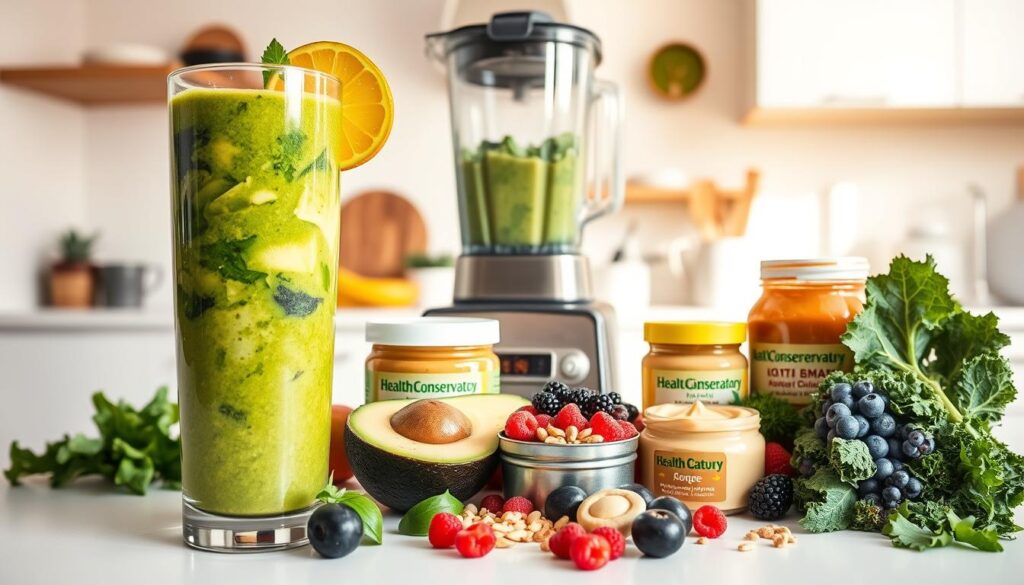
These sample recipes focus on soft textures, modest portions, and ingredients that tend to calm the gut.
Calm Banana-Oat Omega-3 Blend
In a blender add 1 cup unsweetened oat milk, 1/2 cup cooked/cooled applesauce, 1/2–1 ripe banana, 2–3 tablespoons rolled oats, 1 tablespoon ground flaxseed, a pinch of cinnamon, and ice. Blend 45–60 seconds until silky.
Why: Supplies soluble fiber and resistant starch for stool consistency plus omega-3 fatty acids and potassium.
Green-but-Gentle Spinach-Squash Smoothie
Combine 1 cup almond milk, 1/2 cup pre-steamed/cooled butternut squash, 1 cup baby spinach, 1 tablespoon chia gel, 1–2 teaspoons maple (optional), and ice. Blend thoroughly and strain if needed.
Why: Mild vitamins and soft fiber with a lactose-free base that eases the bowel.
Berry Antioxidant Smoothie with Chia Gel
Blend 1 cup soy milk, 1/2 cup cooked/cooled applesauce, 1/2 cup strained blueberries, 1 tablespoon chia gel, and 1 teaspoon ground hemp hearts until very smooth.
Why: Berries supply antioxidants; soy milk adds protein without lactose. Strain seeds if they irritate your gut.
“Oat bran raised fecal butyrate by about 36% in a four-week study of UC patients.”
| Recipe | Key benefits | Use tip |
|---|---|---|
| Banana-Oat | Soluble fiber, potassium, omega-3 source | Sip slowly; halve portion if sensitive |
| Spinach-Squash | Low acidity, vitamins, gentle fiber | Strain for smoother texture during flares |
| Berry-Chia | Antioxidants, protein (soy), gelled chia | Use strained berries to limit seeds |
Smart Prep: Texture, Portion Sizes, and Timing
Simple prep choices can change how your blend feels in the gut and lower the chance of a symptom spike.
Blending tips to reduce particle size and roughage
Blend longer—aim 45–90 seconds to shrink particles and ease mechanical stress on the bowel.
Peel, steam, and cool firm veggies such as squash or carrots before you blend. This softens fiber and may reduce inflammation.
If small seeds or skins bother you, strain the drink through a fine mesh for a smoother mouthfeel.
Portion control to prevent symptom triggers
Start with small servings (1/2 to 3/4 cup) and increase slowly as your tolerance grows. Sip slowly and avoid very cold temperatures if your gut feels sensitive.
Space blends between meals, separate them from supplements or coffee, and skip alcohol near smoothie times to lower risk and protect overall health.
“Keep a tight rotation of well-tolerated ingredients and add only one new item at a time.”
| Prep Step | Why it helps | Quick tip |
|---|---|---|
| Longer blending | Reduces rough particles that irritate | 45–90 seconds per batch |
| Cook & cool firm veggies | Softens insoluble fiber; eases digestion | Steam 5–10 minutes, cool before blending |
| Strain if needed | Removes skins/seeds that trigger symptoms | Use fine mesh during flares |
| Smaller portions | Prevents overfilling and sudden bowel response | Start 1/2–3/4 cup; track reactions |
Beyond Smoothies: UC-Friendly Vegan Snacks
Simple plant-based bites can give protein, potassium, and gentle fats without upsetting a sensitive bowel.
Keep portions small and textures soft. Start snacks that mirror your blender logic: low-residue, modest sugar, and gentle fats that support digestion.
Practical snack ideas
- Hummus: Start with 1/4 cup and pair with soft bread or rice crackers. Avoid whole-grain roughness during a flare.
- Roasted chickpeas: Try about 1/4 cup to test tolerance. They also contain soluble fibers that can ferment into helpful short-chain fatty acids.
- Smooth nut butters: Almond or cashew spread thinly on soft bread or rice cakes is easier than whole nuts.
- Banana nut butter wraps: A soft tortilla with thin nut butter and sliced bananas gives quick potassium and calories.
- Yogurt-style bases: Unsweetened soy, oat, or almond alternatives help if you avoid lactose.
| Snack | Portion | Why |
|---|---|---|
| Hummus + soft pita | 1/4 cup | Protein, iron, folate; gentle texture |
| Roasted chickpeas | 1/4 cup | Soluble fiber that may help short-chain fatty acid production |
| Smooth nut butter wrap | Thin spread | Easier fats and calories than whole nuts |
“Choose small, frequent snacks that match your tolerance and avoid dense coconut-heavy vegan cheese while inflamed.”
Also, keep soups, purees, and soft fruit purées handy. Reassess coconut-heavy products later in remission and favor snacks that protect the mucus layer and steady your digestion.
Use Our Smoothie Generator to Personalize Your UC-Friendly Blends
Find a simple way to design plant-based blends that match your symptoms, phase of recovery, and taste.
The generator guides you step-by-step so you pick gentle bases, measured soluble fiber, and omega-3 seeds that aim to help reduce symptom spikes.
Match ingredients to symptoms, diet stage, and taste
You choose textures, portion sizes, and ingredient intensity based on your current tolerance. This supports daily nutrition goals while respecting flare limits.
Start crafting your blend now: https://healthconservatory.com/smoothie-generator
Use the tool to avoid high-fructose juices, coconut or palm fats, and gritty textures. Built-in tips summarize the role of oats, chia gel, and cooked/cooled fruits so you scale fiber safely.
“Save favorite blends and share them with your care team to integrate into broader health plans.”
- Filter by taste (creamy, fruity, green) and functional goals (energy, gut comfort).
- Personalize thickness and portions, then save recipes you trust.
- Rely on research-aligned suggestions to shape a safer vegan diet and support overall health.
| Feature | Why it helps | Quick action |
|---|---|---|
| Symptom filter | Matches ingredients to current tolerance | Select flare, recovery, or maintenance |
| Ingredient swaps | Reduces trigger foods like high-fructose syrups | Choose suggested vegan alternatives |
| Portion & texture | Controls load and particle size | Set cup size and blend time |
| Save & share | Keep consistent recipes and clinical notes | Export or show to your care team |
Start crafting your blend now: https://healthconservatory.com/smoothie-generator
Conclusion
,
In short: a well-made blended drink can help you meet daily nutrition while you manage ulcerative colitis and related colitis symptoms.
Emphasize soluble fiber, ground omega‑3 seeds, and low‑irritant liquids. Avoid high‑fructose sweeteners and coconut/palm fats to lower flare risk and protect the gut.
A plant‑forward approach fits many inflammatory bowel disease guidelines and supports the microbiome and bacteria that help healing.
Keep portions modest, blend thoroughly, and track what works for you. People respond differently, so share patterns with your care team and adjust dietary plans.
Use the Smoothie Generator to tailor blends to your symptoms, taste, and recovery goals: https://healthconservatory.com/smoothie-generator

